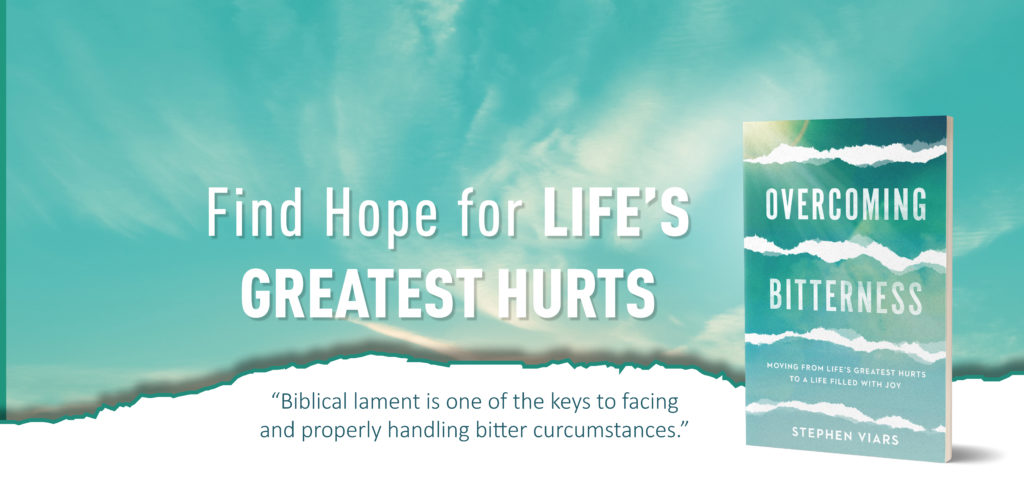
This article was adapted from a new book by Pastor Viars entitled Overcoming Bitterness.
Suffering. Even in the best of times there are always hurts, disappointments, and trials to process. These days as the worldwide pandemic continues to rage, we seem to be surrounded by suffering at every turn. Just this week I learned that one of my close friends in college died of COVID-19 at the age of 56. Many people I know and serve in local church ministry have a similar story to tell.
My question is, does the Lord want us to suffer in silence? Last year, I read a book by David McCollough titled The Pioneers. It is a fascinating story about the early settlers of Marietta, Ohio, many who were godly men and women whose Christian faith caused them to insist that slavery would never be practiced in their state.
One of the Ohio patriarchs was Ephraim Culter, a man who along with his family had a powerful, Christlike impact in this fledgling part of the country in the mid-1800’s. However, he faced a terrible trial when he received word that his oldest son Charles had died of cholera while prospecting for gold in California. His daughter Julia spoke for the family when she wrote of her brother, “to think of his dying away from home and friends, buried upon those vast plains where no one even knows his place of rest.” Then she explained that while the blow was hardest on her father Ephraim, “he is very much bowed down under the stroke—still he murmurs not, the language of his heart seems to be, ‘I was dumb. I opened not my mouth, because the Lord dids’t it’. Occasionally we hear a suppressed groan as he walks his room with clasped hands.”
Students of Scripture will recognize that Julia quoted Psalm 39:9 in explaining her sweet, broken father’s response. But is that what God demands of his children? That we suffer in silence? That we bow down without murmuring a word, occasionally uttering a suppressed groan?
I have no doubt that these dear men and women were very sincere in their beliefs. However, passages like Psalm 39:9 need to be read and understood in their context. The writer King David had already explained his hesitancy to speak in verse 1 of the Psalm, “I will guard my ways that I may not sin with my tongue; I will guard my mouth as with a muzzle while the wicked are in my presence.” He wanted to be sure that anything he said before those who did not yet know the Lord could not be misunderstood and perhaps used to justify one’s unbelief.
However, that was hardly the end of the story. David even states in the very next verse that when he remained “mute and silent,” his “sorrow grew worse” (Psalm 39:2). This is why in the remainder of this beautiful Psalm of lament, David records how he speaks openly to God about his pain. For example, in verses 3-4, he proclaims, “My heart was hot within me, while I was musing the fire burned; then I spoke with my tongue; ‘Lord, make me know my end and what is the extent of my days; let me know how transient I am.’”
This passage describes an approach to suffering that is anything but suffering in silence. Our God invites us to come directly into His throne-room with our pain, hurts, and regrets and speak freely and openly to Him about what is occurring to us, in us, and around us. Practicing biblical lament is not a sin, it is an expression of faith that our God cares and that He has answers and hope for His weary children.
Failing to exercise biblical candor with the Lord and those around us is often a self-destructive path. “The heart knows its own bitterness,” Proverbs 14:10 affirms. The choice is clear, we either properly vocalize our suffering to God and those around us or we slowly cultivate a low-grade anger and disappointment that will dull our spiritual senses and poison our relationships. Suffering in silence often produces bitterness of the soul.
Thankfully, the One greater than David made this kind of direct access to our Father’s throne possible. “Therefore let us draw near with confidence to the throne of grace, so that we may receive mercy and find grace to help in time of need” (Hebrews 4:16).
Bitter circumstances do not have to result in a bitter heart and life. Don’t ever suffer in silence. Instead, speak freely and openly with God and others and ask your heavenly father to help you process pain in a way that produces sweetness of heart and life.
 Church
Church